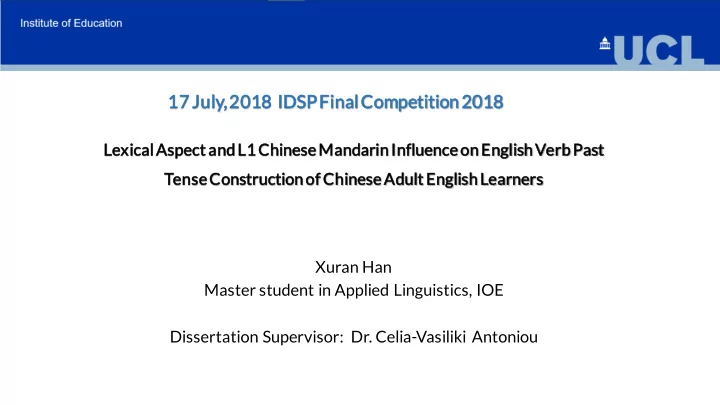

17 J July, 2 2018 IDSP F P Final C Competition 2 2018 Lexical A Aspect a and nd L L1 C Chi hine nese M Mand ndarin I n Inf nflue uenc nce o on E n Eng nglish V h Verb P Past Tense C Cons onstruc uction o on of C Chine nese A Adul ult E Eng nglish L h Learne ners Xuran Han Master student in Applied Linguistics, IOE Dissertation Supervisor: Dr. Celia-Vasiliki Antoniou
Contents • Present Study Design • Data Analysis • Discussion
Review of Aspect Hypothesis Predictions • Learners’ uses of perfective/past markings will extend to activities and statives from achievements and accomplishments. • In languages which are with distinctions of perfective/imperfective, imperfective past emerges later than perfective past, and imperfective past marking firstly appears on statives, then on activities, following extends to accomplishments and finally on achievements. • In languages that have progressive aspect, progressive marking begins with activities, then extends to accomplishments and achievements. • Progressive markings are not incorrectly overextended to statives.
Present Study • Empirical Tasks Task 1 : Written short passage cloze (Adapted from BHR task, 1995) Group students into different levels of appropriate simple past uses. Probe students’ uses of simple past across verbs/predicates with different lexical aspects. Task 2: Mandarin-English translation (Adapted from Hong’s study, 2008) Test Mandarin influences on participants’ construction of English simple past. Test Mandarin aspectual marker –le influences on students’ uses of perfect forms in past context. Task 3: Written storytelling narration (widely used by previous studies) Investigate students’ English simple past constructions during narrative process.
Data C Collecting • In classroom setting • Explaining the project to participants • Consent and signature • Participants were given task materials • Complete tasks one by one • Once finished all task, feel free to go
Data Analysis • quantitativecross-sectional work • Participants’ appropriate uses of simple past in cloze and writing tasks are calculated. • Participants are grouped, based on their uses of simple past in cloze • applying MANOVA and ANOVA to test significances of differences among participants’ performances in empirical tasks
Data Analysis • Distribution of Simple Past across Groups • Distribution of simple past across lexical aspect • Distribution of non-simple-past forms across groups • Distribution of non-simple-past forms across lexical aspect
• cloze task: significant differences of simple past uses across the three groups. • MANOVA analysis: test whether there was a significant difference in simple past uses across 4 different types of verbs.
• cloze task: there was a significant difference in three groups’ simple past uses across lexical aspect [F (8,108) =23.557, p=.000]. • Findings in cloze task: learners from all three group with different English past morphology knowledge proficiency used simple past with achievements most, and with their proficiency grew, the percentage use of simple past across four lexical aspectual verbs all increased.
Translation Task: ANOVA analysis: reveal the significant differences between groups and simple past uses 1. significant differences between groups and simple past uses: F (2,57) =26.052, p=.000 2. significant differences between marking simple past with verbs in sentences with aspectual -le and groups 3. significant differences in simple past uses for sentences without aspectual marker -le
MANOVA analysis: significant difference between different lexical aspectual verb classes and the uses of simple past. significant difference between simple past uses across lexical aspect and groups. Thus: three group participants preferred to use simple past on accomplishments and activities, while marking states with simple past was a common difficulty faced with all group participants.
Disc scussi sion • Lexical aspect and simple past uses Cloze task: participants’ uses of simple past for activities and states gradually climbed to a higher percentage just followed the percentage use of simple past for achievements. Writing task: participants also preferred to mark states with simple past. Not fully support predictions of Aspect Hypothesis. Translation task: participants used simple past with states at least and marked simple past with activities much more than states. Support predictions of Aspect Hypothesis.
Disc scussi sion • Lexical aspect and non-simple-past form responses • Cloze task: present form existed in all three groups’ works and states are mos frequently marked with present form. (verified what Aspect Hypothesis mentioned: states attracted learners to mark simple present the most compared with other forms) • Writing task: base and simple present forms were competitive forms with simple past in past context narration. • Translation task: present form competed with participants’ simple past markings and uses.
Disc scussi sion L1 influence Translation task: L1 Mandarin aspectual marker -le affected participants’ English perfect and simple past uses. Cloze and narrative tasks: Mandarin as a language without inflectional markings influenced Chinese ESL learners’ English past context inflection markings.
Disc scussi sion Learners with and without one-year oversea study experience performance comparison Two clusters of participants’ simple past uses did not show significant differences, and two cluster participants performed very similar, especially in cloze task.
Disc scussi sion Learners with and without one-year oversea study experience performance comparison After one-year Master programme study in English speaking country, there was no significant changes for participants’ simple past uses and English past tense and aspect improvements.
Disc scussi sion Learners with and without one-year oversea study experience performance comparison Translation task: participants who had one-year English-speaking country study experience used simple past more intensively and focused than those without one-year oversea study experience in general. English-speaking country study experience influenced these Chinese adult ESL learners’ English past tense and aspect uses in Mandarin-English translations.
Conc nclus usion on: Partially supported the predictions of Aspect Hypothesis. L1 constantly affected these Chinese adult ESL learners’ acquisition of English tense and aspect system.
Recommend
More recommend